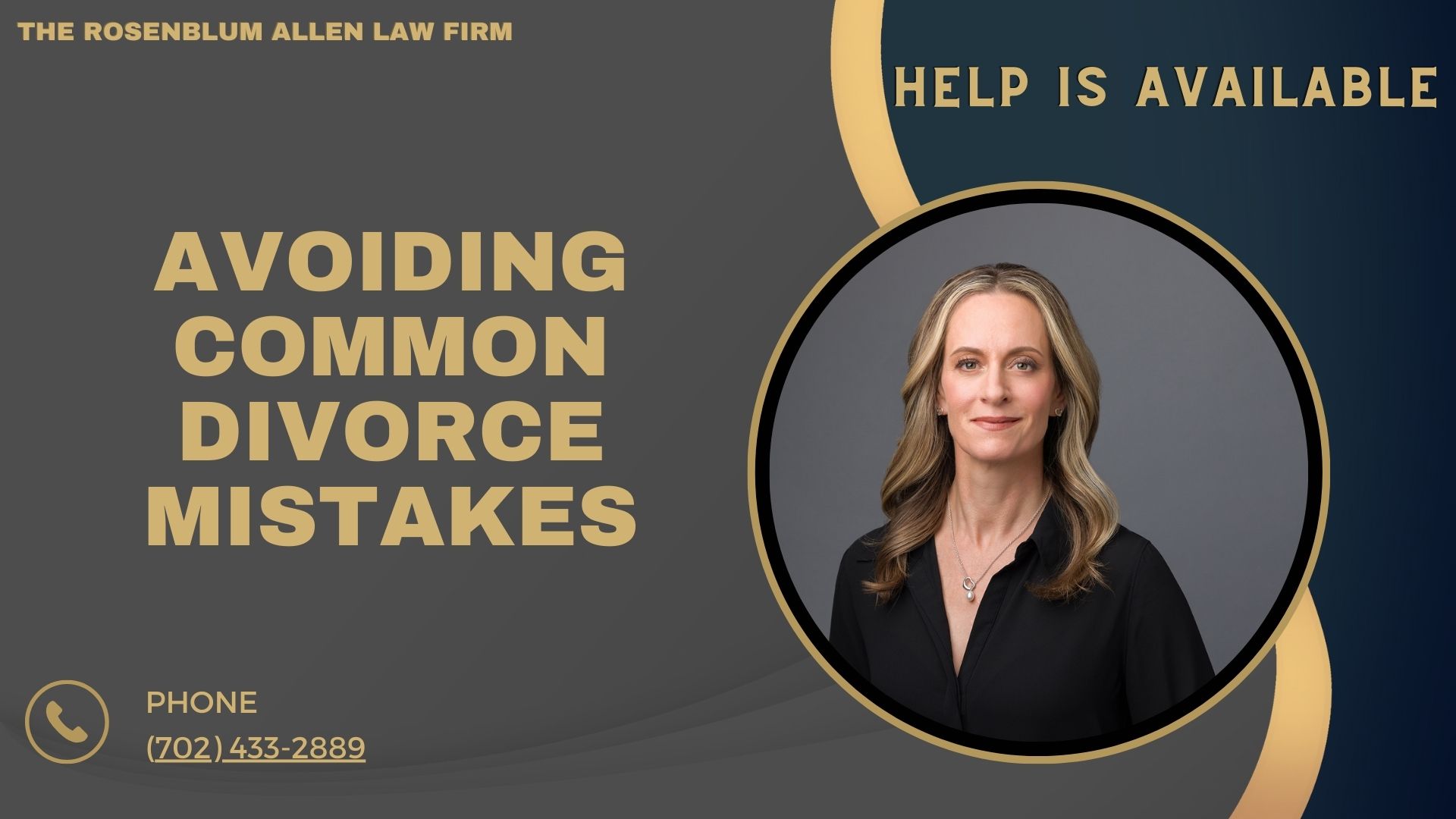Divorce is a complex and emotionally charged process that can be fraught with pitfalls. Making mistakes during this crucial time can have long-lasting effects on your financial stability, emotional well-being, and legal standings. This guide highlights common errors and provides actionable advice to help you navigate your divorce more smoothly and effectively.
Failing to Understand the Legal Process
Misunderstanding Your Legal Rights
Many individuals going through a divorce do not fully understand their legal rights, which can lead to unfavorable outcomes. Here are key points to consider:
- Consult a Divorce Attorney: It’s crucial to seek legal advice early. An attorney can provide tailored guidance based on your situation and local laws.
- Know Your State’s Divorce Laws: Divorce laws vary significantly from state to state. Understanding your state’s specific requirements and procedures is essential to protect your rights.
Rushing Through the Process
The desire to quickly end a painful chapter can lead to rushed decisions that might not be in your long-term best interest.
- Risks of Quick Resolutions: Quick agreements might overlook important details like pension plans, insurance, or other assets.
- Importance of Thorough Negotiation: Taking the time to negotiate thoroughly can ensure a more equitable division of assets and better custody arrangements if children are involved.

Overlooking Financial Implications
Underestimating the Cost of Divorce
Divorce can be expensive, and failing to anticipate all costs can impact your financial planning.
- Hidden Costs: In addition to attorney fees, there are costs for court filings, copies of documents, and possibly fees for financial advisors and other consultants.
- Financial Planning Post-Divorce: It’s essential to understand how your finances will be affected in the long term, including tax implications and changes in living expenses.
Mismanaging Assets and Debts
Proper management of assets and debts during a divorce is crucial for your financial health.
- Accurately Disclosing Assets: Ensure all assets are disclosed. Hidden assets can be penalized by the court.
- Handling Joint Debts: Decide who will be responsible for joint debts. If possible, close joint accounts to prevent further accrual of joint debt.
In conclusion of these initial sections, understanding the intricacies of the legal process and the financial implications of divorce are foundational steps in avoiding common mistakes. Seeking professional advice and addressing these areas thoroughly can save you from significant troubles down the road. In the following sections, we will delve into the emotional aspects of divorce and the importance of using mediation and counseling services.

Emotional Decisions Overruling Logic
Letting Emotions Drive Legal Decisions
Divorce is emotionally challenging, and it’s common for emotions like anger or sadness to cloud judgment. Here’s how to maintain objectivity:
- Impact of Emotions on Settlement Terms: Decisions made in anger or spite can lead to unfair or unwise settlements. It’s vital to approach negotiations calmly and rationally.
- Strategies for Maintaining Objectivity:
- Pause and reflect before making decisions.
- Consult with your attorney before agreeing to terms.
- Consider counseling to manage emotional stress effectively.
Neglecting the Needs of Children
Children can be profoundly affected by divorce. Ensuring their well-being should be a priority.
- Fair Child Custody Arrangements: Work towards a custody arrangement that best supports your children’s daily life and emotional health.
- Keeping Children’s Best Interests at Heart:
- Involve a child psychologist if needed to understand the impact of your decisions.
- Keep routines as normal as possible to provide stability.

Not Utilizing Mediation and Counseling Services
Ignoring the Benefits of Mediation
Mediation can significantly simplify divorce by helping both parties reach an amicable agreement.
- How Mediation Can Simplify the Divorce Process:
- Mediators help facilitate discussions to find common ground.
- Reduces the emotional and financial cost of court proceedings.
- Role of Mediators in Conflict Resolution: Mediators are neutral parties who negotiate fair agreements, focusing on the best outcomes for all involved.
Avoiding Therapeutic Support
The stress of divorce can take a toll on your mental health, making therapeutic support essential.
- The Emotional Toll of Divorce:
- Divorce can lead to feelings of loneliness, depression, and anxiety.
- It’s important to recognize and address these feelings early.
- Finding and Utilizing Support Networks:
- Seek support from therapists who specialize in divorce.
- Consider support groups where you can connect with others facing similar situations.
By managing the emotional aspects of your divorce and utilizing available mediation and counseling services, you can better navigate the challenges of this transitional period. These strategies can help protect your legal and financial interests and support your emotional health and that of your family. The following sections will explore the importance of proper documentation and record-keeping and how to prepare for legal proceedings adequately.

Lack of Proper Documentation and Record Keeping
Failing to Keep Accurate Records
Keeping detailed records throughout your divorce process is helpful and necessary for ensuring all agreements are followed and financial issues are clearly understood.
- Importance of Documenting All Financial Transactions and Agreements: Documenting details such as asset distribution, debt division, and alimony or child support arrangements helps avoid disputes later.
- Tips for Organizing Documentation Effectively:
- Use a dedicated file for all divorce-related documents.
- Keep a log of communications and decisions with dates and brief descriptions.
Inadequate Preparation for Legal Proceedings
Being unprepared for legal proceedings can lead to unfavorable court outcomes. Preparation is key to presenting your case effectively.
- What to Prepare for Court Appearances:
- Gather all necessary financial documents, such as tax returns, bank statements, and pay stubs.
- Prepare a timeline of significant events and decisions relevant to the case.
- The Role of Legal Counsel in Preparation:
- Your attorney can guide you on the crucial documents for your case.
- They will also rehearse possible questions with you and help frame your responses.

Breaking It All Down
In this guide, we’ve covered the critical areas to avoid common divorce mistakes, from understanding the legal aspects and managing financial implications to handling the emotional dynamics and ensuring thorough preparation for legal proceedings. Each step requires careful consideration and a systematic approach.
Remember, the goal of this guide is to equip you with the knowledge and strategies needed to navigate your divorce with fewer setbacks and a clearer focus. Seeking professional advice and support throughout the process is highly recommended to ensure you make informed decisions that will benefit your future.
Take time, stay organized, and prioritize your well-being and children’s. You can move through this challenging time with strength and confidence with the right approach.

Frequently Asked Questions
What should I do if I discover hidden assets after the divorce settlement?
If hidden assets come to light post-settlement, inform your attorney immediately. They can help file a motion to reopen the case based on this new evidence, potentially altering the settlement terms.
How can I ensure my children are coping well with the divorce?
Regularly communicate with your children about their feelings. Consider involving a child therapist or counselor to provide additional support and guidance during this transition.
What are some strategies to manage joint debts during a divorce if we are both liable?
Prioritize paying off joint debts before finalizing the divorce or establish formal agreements to redistribute debts equitably, ensuring clarity and preventing future complications.
Is it necessary to change my will and other legal documents post-divorce?
Yes, it’s crucial to update legal documents like your will, life insurance, and retirement accounts after a divorce to reflect your current wishes and remove your ex-spouse as a beneficiary or decision-maker.
How long should I keep divorce documentation?
Keep all divorce-related documents indefinitely, or at least for seven years, including financial records, agreements, court orders, and any correspondence related to the case.
Can I modify child custody or support arrangements after the divorce is final?
You can seek modifications to custody or support arrangements post-divorce if significant changes occur, such as income changes, relocation, or evolving child needs. Petition the court with evidence to justify the changes.
What are some tips for choosing a mediator?
Select a mediator with experience in divorce cases and a good reputation. Consider their background in law or psychology, and seek referrals from your attorney. Past client reviews can also provide valuable insights.
Should I stay in the marital home during the divorce process?
Whether to stay or move out of the marital home depends on factors like safety, legal advice, and personal circumstances. Staying may help ensure your interests are represented in property division, but consult your attorney for tailored advice.

Glossary
Divorce Attorney: A lawyer specializing in divorce law and providing legal advice and representation during the divorce process.
State-Specific Divorce Laws: Laws that vary by state and govern the procedures and rules for obtaining a divorce, including grounds for divorce, division of assets, child custody, and support.
Mediation: A form of alternative dispute resolution where a neutral third party, the mediator, helps disputing parties find a mutually agreeable solution to their conflict outside of court.
Therapeutic Support: Professional counseling services aimed at helping individuals manage the emotional stress associated with divorce.
Child Custody Arrangements are agreements between divorcing parents that outline the legal and physical custody of their children, including where the children will live and each parent’s decision-making rights.
Financial Transactions: All monetary exchanges, including the acquisition or sale of assets, which may be scrutinized during a divorce to ensure fair division.
Legal Proceedings are formal processes carried out in court, including hearings and trials, where legal rights and obligations are determined and enforced.
Asset Disclosure: Each spouse must declare all financial assets during a divorce to ensure an equitable division.
Court Appearances: Instances where divorcing parties must appear in court to present their case or respond to legal actions in the divorce process.
Settlement Terms are the agreed-upon conditions and arrangements in a divorce, including asset distribution, custody arrangements, and financial support, which are often formalized in a legal document.
Beneficiary: A person designated to receive benefits from a legal instrument, such as a will, trust, or insurance policy, often needs to be revised after a divorce.
Child Support: Financial contributions required by law by a non-custodial parent to support their children’s living expenses post-divorce.

Additional Resources for You
To further support you during your time of need, our lead attorney, Molly Rosenblum Allen, Esq., has created a comprehensive suite of resources tailored to address various aspects of the divorce process. These resources provide in-depth information and guidance to help you navigate through your divorce more effectively:
For a detailed look at what to expect from a divorce attorney in our area, visit Las Vegas Divorce Attorney.
Understand the specificities of Nevada divorce laws at Nevada Divorce.
Get tips on coping with the emotional and practical challenges of divorce with our Surviving Divorce guide.
Find out what happens if you don’t sign the divorce papers at What Happens If You Don’t Sign Divorce Papers.
Wondering if you need an attorney for your divorce? Read Do I Need an Attorney to Get a Divorce.
Learn about a less adversarial divorce method at What is a Collaborative Divorce.
Discover strategies for a favorable outcome in How to Win a Divorce.
Considering changing your legal representation? Read Switching Lawyers During Divorce.
Understand the timeline of a divorce in Nevada at How Long Does a Divorce Take in Nevada.
Explore the complexities of a high-stakes separation with High Conflict Divorce.
Prepare for your consultation with Questions to Ask a Divorce Lawyer.
These resources are designed to provide you with effective advice and insights from a trusted legal professional, helping you feel more prepared and informed every step of the way.

Outside Resources for You
American Bar Association (ABA): Offers general information on family law and resources for finding lawyers. Visit the ABA
National Parenting Organization: Provides support and resources for co-parenting arrangements. Visit National Parenting Organization
National Association of Divorce Professionals (NADP): An association that provides networking and resources for professionals involved in the divorce process, including legal, financial, and mental health support. Visit NADP
Mental Health America (MHA): Offers resources on managing stress and mental health during significant life changes, such as a divorce. Visit Mental Health America
DivorceCare: A community-based support group that offers assistance and guidance to people going through divorce. Visit DivorceCare
WomensLaw.org: Provides legal information and resources specifically for women, covering topics like divorce, custody, and abuse. Visit WomensLaw.org
Smart Stepfamilies: Offers guidance and resources for blending families after divorce. Visit Smart Stepfamilies

A Special Message from Our Lead Attorney, Molly Rosenblum Allen, Esq

Thank you for taking the time to read through our resources. We hope you found the information helpful and enlightening as you navigate this challenging period. Divorce can be complex and emotionally taxing, but you don’t have to handle it alone.
If you’re ready to take the next step or have any questions about your situation, please don’t hesitate to call me and my team at (702) 433-2889. We are here to support you and provide the legal guidance to move forward.
I look forward to helping you get the ball rolling on your situation.
Warm regards,
Molly Rosenblum Allen, Esq. The Rosenblum Allen Law Firm



